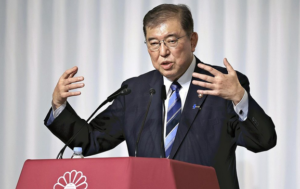TOKYO ã Japanese Prime Minister Shigeru Ishiba announced his resignation today, less than a year after taking office, amid growing internal dissent and significant election defeats for the ruling Liberal Democratic Party (LDP). The move comes after Ishiba concluded a pivotal U.S.ãJapan trade agreement, and follows mounting concern that continued leadership could fracture the LDP.
ãPassing the Batonã After Trade Deal
Ishiba acknowledged the toll of consecutive electoral setbacks, including the July upper house defeat that stripped the LDP of its parliamentary majority. He said he had withheld his resignation to ensure that U.S.ãJapan tariff talks reached a successful conclusion first.
ãWith Japan having signed the trade agreement and the president having signed the executive order, we have passed a key hurdle,ã Ishiba said, his voice catching with emotion. ãI would like to pass the baton to the next generation.ã
Elections Defeat and Escalating Party Divisions
The recent electoral losses have heightened factional tension within the LDP, prompting senior figuresãsuch as former Prime Minister Yoshihide Suga and Agriculture Minister Shinjiro Koizumiãto publicly pressure Ishiba to step aside. The decision came just ahead of an expected no-confidence vote.
ãIf the LDP remains the same without any change, there will be no tomorrow for the partyãÎã Ishiba warned, highlighting the urgent need for reform to avoid the partyãs collapse.
Political Fallout: What Comes Next?
Ishiba will maintain his duties as prime minister until the LDP selects a successor. The party now faces an emergency leadership contest, with prominent candidates including Sanae Takaichi and Shinjiro Koizumi.
Analysts warn of possible turbulence in Japanãs economy and political scene, especially as internal divisions compound geopolitical tensions and a weakened parliamentary position. Financial markets have already responded, with a sell-off in the yen and government bonds experiencing increases in yields.
Resignation Sparks Policy Uncertainty
Ishibaãs brief termãjust shy of a yearãunderscores the instability of a minority government grappling with inflation, geopolitical anxieties, and a disillusioned electorate. While his resignation marks a turning point, it also ushers in a period of uncertainty as Japan navigates leadership transitions amid deep political fissures.ô (zai)

